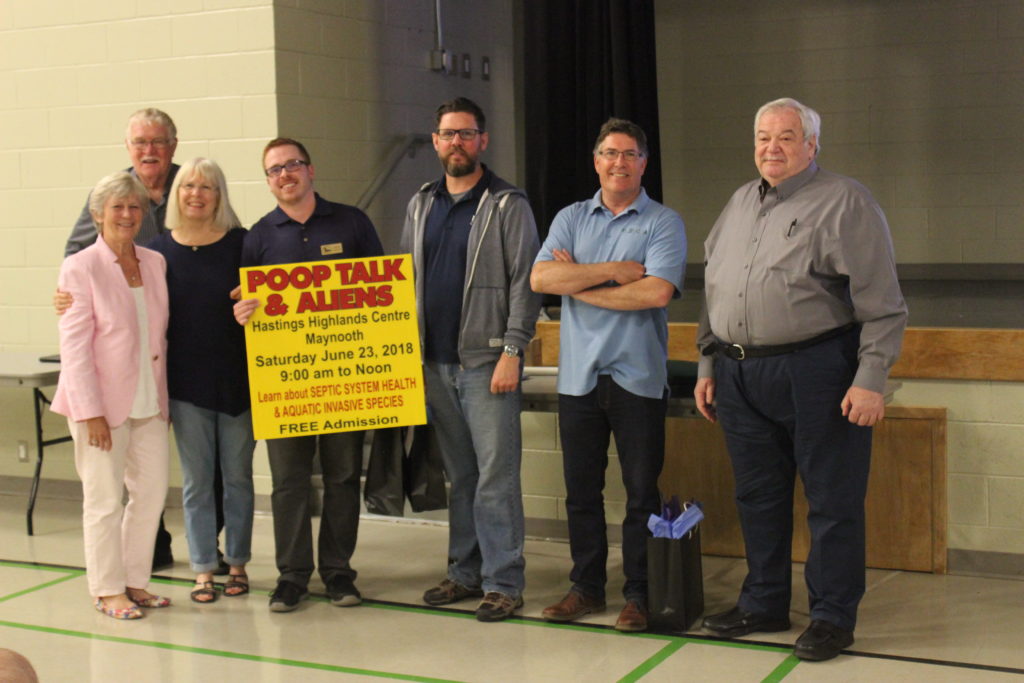|
Bancroft this Week https://www.bancroftthisweek.com/north-hastings-gets-the-scoop-on-poop/ Export date: Mon Feb 23 13:07:53 2026 / +0000 GMT |
North Hastings gets the scoop on poop Organizers and speakers from the Poop Talk and Aliens event take a moment to congratulate each other on a job well done getting the information out about protecting area lakes and the water supply. / SARAH SOBANSKI Staff By Sarah Sobanski Rick Esselment, CEO of ESSE and former president of the Ontario Onsite Wastewater Association, wants to know how much locals and cottagers know about their septic systems. They will be asking questions about septic tank pumping 1, maintenance, and other general knowledge that must be known before you decide to get in touch with an installation company like Byers Septic to incorporate a septic tank within your property. All of this information will be invaluable when it comes to owning your own septic system. Esselment attended the Hastings Highlands Centre June 23 for its Poop Talk and Aliens event. The event featured heavily in all things lakes, water and wastewater with experts from the Federation of Ontario Cottagers' Associations, Federation of Anglers and Hunters/Ontario Invasive Species Awareness Program and ESSE. ESSE Canada specializes in septic system maintenance and inspection services. Esselment told the audience it can be harmful to the environment if people don't know how to look after their septic systems properly - and many don't. Obviously, these people can have septic backup 2 from professional companies, but it would be beneficial for them all to know how their septic tanks actually work. First on the list, start a file, he said. Keep record of your septic system's health. "Even if it's just on a napkin, it's still a file," he joked. According to Esselment, the thinking around septic systems is changing. He explained the majority of treatment happens in the soil, not in the tank, estimating a 20 per cent to 70 per cent ratio. "The tank just takes the solid stuff out before it goes into the soil," he explained. But bacteria builds up in the soil and "exhausts it." Thinking of a septic system as something that only needs to be fixed if it's broken isn't a way of thinking that works. Waiting until there is visible damage can be "catastrophic to the environment" including contamination of the water table. Esselment said it was "imperative" that waterfront property owners have their systems inspected. "Just because you can't see it bubbling up doesn't mean it's not broken," he said. "There's a problem with septic understanding and maintenance across this province." Esselment took the audience through photos of eroded septic tanks, septic bubbling up on lawns and MacGyvered rerouting systems transfering wastewater into lakes or ditches. He said many of the issues were found during home inspections for real estate transactions. "When people ask what we do I tell them we're in water protection," he said, adding he wasn't embarrassed that meant inspecting septics to make sure they run properly. Before the turn of the century septic systems were half the size they are today, Esselment explained. He said the wider distribution area allowed for a bigger treatment area. Septics more than 35 to 40 years old might be at the end of their lifespans. One cottager asked if that lifespan was doubled if the system was used seasonally. Esselment said that could be the case, but he noted that people tended to "kick the crap out of their septic systems" during the summer when they were on cottage properties. He said with an influx of visitors and usage it might depreciate faster. He recommended the system be checked every 24 months. Other septic tips from Esselment included only pumping the system when it needed to be pumped so that it could maintain its "biology" to properly do its job. Additionally, filling a septic halfway with water once it's been pumped will help it get back to functioning properly and stop it from lifting underground. He also advised against the old adage, "If it's yellow, let it mellow." He said "letting it mellow" would stain the toilet faster and as such mean it would need to be cleaned more. This would lead to more chemicals and interuptants in the system. Esselment said that a septic was meant to deal with toilet paper and to let it do its job. That being said, he noted getting a low-flush toilet might increase the life of a septic and to avoid flushing food waste down the drain whenever possible. |
| Excerpt: Rick Esselment, CEO of ESSE Canada and former president of the Ontario Onsite Wastewater Association, wants to know how much locals and cottagers know about their septic systems. |
Links:
|
|
Post date: 2018-06-27 14:02:25 Post date GMT: 2018-06-27 18:02:25 Post modified date: 2018-06-27 14:02:25 Post modified date GMT: 2018-06-27 18:02:25 |
|
Export date: Mon Feb 23 13:07:53 2026 / +0000 GMT This page was exported from Bancroft this Week [ https://www.bancroftthisweek.com ] Export of Post and Page has been powered by [ Universal Post Manager ] plugin from www.ProfProjects.com |